Author: Todd Holmes
Port Chicago Commemoration – Release of Robert L. Allen Oral History
This week marks the 76th Anniversary of the Port Chicago Explosion, the worst disaster of America’s World War II home front that took the lives of 320 African American men, and led to the largest work stoppage and mutiny trial in military history. On Friday, July 17 at 1:00pm, The National Park Service will hold a virtual commemoration to honor the deceased, the impact their loss had on addressing racial inequality, and the importance of social justice moving forward. In conjunction with this event, the Oral History Center is pleased to release the oral history of Robert L. Allen, award-winning journalist, author, and professor of African American Studies, whose 1989 book, The Port Chicago Mutiny, uncovered this untold story and helped lay the foundation for what became the Port Chicago Naval Magazine National Memorial. In addition, the Oral History Center has also released the newly-digitized oral histories with Port Chicago survivors that Allen conducted for the seminal book.
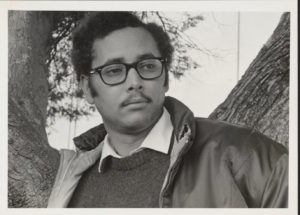
In many respects, the life of Robert Allen proves as extraordinary as the many African American men and women whose stories he brought to light through nearly fifty years of writing and scholarship. Born in 1942, Allen grew up in segregated Atlanta where he experienced firsthand the harsh realities of racism, the complicated divisions which ran through the Black community, and the bridges of solidarity that ultimately helped forge the Civil Rights Movement. A graduate of Morehouse College, he moved to New York City in the early 1960s where he abandoned an internship with IBM for a reporting job with the National Guardian. As the publication’s first Black journalist, Allen became a leading voice in documenting the African American experience in the City and the growing intersection between the Civil Rights and Anti-War Movements. In 1967, that intersection became personal as Allen formally refused his draft notice and formed the anti-draft group African Americans for Survival. That same year, his work with the National Guardian allowed him the rare opportunity to explore that same intersection on the international level, attending the International Peace Conference in Czechoslovakia, as well as a multi-week tour of both North and South Vietnam. In 1968, Allen moved to the Bay Area of California to head up the publication’s San Francisco office. It was a region the native Atlantan would come to call home.
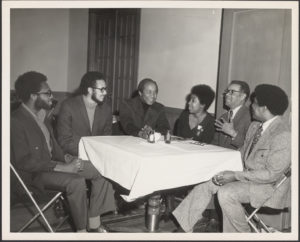
The Bay Area not only once again gave Allen a front row seat to national change, it also proved a fertile ground for his growing intellectual interests and curiosity. He had earned a master’s degree in sociology from The New School during his time in New York City, and continued his studies in California with a doctorate from UC San Francisco. In 1975, he began serving as senior editor for The Black Scholar, a position he would hold for the next thirty-seven years. During Allen’s tenure, The Black Scholar became one of the most influential journals of Black Studies in the country, tackling the most pressing issues of the African American community through both its journal and book series. At the same time, his scholarly career began to take footing in the more traditional academic environments, holding positions at San Jose State, Mills College, and UC Berkeley, where he taught in the African American and Ethnic Studies Departments from 1993 to 2012.
The author and editor of many books on the African American experience, Allen is best known for his 1989 book, The Port Chicago Mutiny, which recounted the untold story of the military explosion that cost the lives of 320 African American men and led to the largest mutiny trial in military history. As Allen discusses in his oral history, he stumbled onto the story by accident in other research during the 1970s, not knowing at all what he had discovered or the impact the story would ultimately have. Shortly after publication, his research and work on the Port Chicago Explosion had earned him a Resolution of Commendation from the California State Assembly, as well as a Northern California Emmy Award for the television documentary—rare honors for an academic and writer. And over the years, the impact of the story continued to grow. By 1994, a memorial was formally established at the site, and in 2009, with the signature of President Barack Obama, the Port Chicago Naval Magazine National Memorial was officially created.
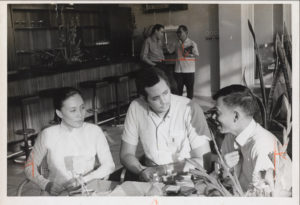
In collaboration with our partner and sponsor, the National Park Service, the Oral History Center is pleased to release Robert Allen: From Segregated Atlanta to UC Berkeley, A Life of Activism and African American Scholarship, as well Allen’s digitized oral histories with Port Chicago survivors, Moreover, the OHC is proud to join the National Park Service in commemorating the 76th Anniversary of the Port Chicago Explosion.
Additional Robert L. Allen collections
Joey Terrill: Chicano Artist, AIDS Advocate, and Favorite Son of East L.A.
The Oral History Center is pleased to release our life history interview with famed Chicano artist Joey Terrill: At the Forefront of Queer Chicano Art.
Joey Terrill is a Chicano artist and second-generation native of East Los Angeles. For nearly four decades, his paintings and prints have stood at the forefront of queer Chicano art, pushing the boundaries of form and cultural representation by exploring the confluences of race and sexuality. In the 1980s, his work expanded further to address the epidemic that was ravaging the arts community: AIDS. From silkscreens and collages to various styles of painting, his artwork has long given voice to the experience of gay Chicanos while simultaneously advocating for racial justice, gay liberation, and HIV awareness.
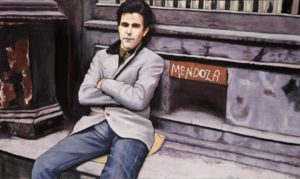
Joey’s artwork was featured in the Getty Center’s 2017 Pacific Standard Time: LA/ LA, an ambitious and far-reaching series of exhibitions across Southern California that explored Latin American and Latino art in dialogue with Los Angeles. In connection with this exhibition, The Getty Center sponsored life history interviews with selected Chicana/o and Latina/o artists, many of whom were showcased in the LA/ LA programs. These interviews, conducted by the Oral History Center at the University of California, Berkeley, aimed to document the lives and experiences of these artists amid the dynamic and changing art world of the West. Joey Terrill was one of the selected artists.
Hollywood itself would be hard-pressed to craft a more touching and heartfelt story than the life story told here in Joey Terrill’s oral history. Raised by a single mother in East Los Angeles, Terrill was heavily influenced by the burgeoning Chicano civil rights movement. He participated in the 1970 Chicano Moratorium as well as the United Farm Workers’ grape and lettuce boycotts during the late 1960s and early 1970s. As an openly gay man, he also linked calls of civil rights to gay liberation—a subject he began to explore in his art. From his “Maricon” photo series and two-issue zine “Homeboy Beautiful,” to his wide range of paintings, Terrill’s artwork created its own space within both the Chicano and gay art scenes. By the mid-1980s, Terrill’s work also began to address the AIDS epidemic, expressing outrage toward homophobia and government inaction, as well as paying tribute to many fallen friends. In recent years his work has also engaged with the experience of being a longtime HIV survivor.
For over four decades he has stood as one of the pioneers of queer Chicano art, and as a true gem of the Los Angeles arts community. Through his art and AIDS advocacy, Terrill has not only touched the lives of thousands, but has also served as a bridge to a new generation of artists, activists, and LGBTQ youth.
New Release: Rick Laubscher – San Francisco Journalist, PR Executive, and Founder of Market Street Railway
Tod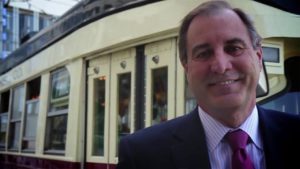 ay we are excited to release the oral history interview of Rick Laubscher. Born in 1949, Rick came of age amid the bustle of Market Street at the family’s business, Laubschers’ Delicatessen. It was in these early years that he developed a fascination in transportation, and a special love of streetcars; the “iron monsters” that rumbled through the streets of San Francisco and past the family’s delicatessen. He spent countless hours as a child drawing city maps (to scale) for his collection of Matchbox trams and buses. And during the age of lava lamps and flower power, his dorm room walls at U.C. Santa Cruz were adorned with transportation maps. Indeed, Rick had what he called “the transportation bug,” a condition that would only grow in time.
ay we are excited to release the oral history interview of Rick Laubscher. Born in 1949, Rick came of age amid the bustle of Market Street at the family’s business, Laubschers’ Delicatessen. It was in these early years that he developed a fascination in transportation, and a special love of streetcars; the “iron monsters” that rumbled through the streets of San Francisco and past the family’s delicatessen. He spent countless hours as a child drawing city maps (to scale) for his collection of Matchbox trams and buses. And during the age of lava lamps and flower power, his dorm room walls at U.C. Santa Cruz were adorned with transportation maps. Indeed, Rick had what he called “the transportation bug,” a condition that would only grow in time.
On the campus of U.C. Santa Cruz, however, Rick also developed an interest in journalism. He created the University’s first radio station, albeit unregistered with the FCC, and upon graduation headed to New York to study at the Columbia School of Journalism, where he was awarded the Pulitzer Fellowship. Returning to California, he started his career as a broadcast journalist with KGTV in San Diego. Here he helped pioneer live reporting in the Southern California market, and won two “Golden Mike” awards for his work. In 1977, Rick returned home to San Francisco as a reporter for KRON-TV. If Herb Caen was the voice of San Francisco, Rick Laubscher was certainly seen by some as the dandy of the city’s television news. Immaculately dressed in a three-piece suit, Rick reported on a number of historic events, most notably the assassination of Mayor George Moscone and Supervisor Harvey Milk. Rick knew both the victims and the killer, and his coverage of the tragedy won him an Emmy Award.
In 1980, Rick left broadcast journalism to embark on a new career as a public-relations executive with the Bechtel Group in San Francisco. Over the next two decades, he worked around the world on behalf of Bechtel, crafting communication programs for both the company and their international clients. In the process, he helped mend relations between San Francisco and its business community, fostering a network of associates that would open the door for a dual career in civic service.
Rick’s affinity for streetcars is matched only by his love for San Francisco. And for nearly forty years, while working for Bechtel and later in private practice, he undertook numerous projects to give back to the City by the Bay. He served on the executive boards of the Chamber of Commerce, SPUR, and the JASON Foundation for Education, and was the founding Chairman of the City Club of San Francisco, one of the first fully open business and civic organizations in the City’s financial district. Above all, he revamped Market Street Railway, the nonprofit that brought vintage streetcars back to San Francisco. What started with an idea among likeminded enthusiasts—Rick calls it a “Mickey Rooney / Julie Garland Moment” of “Why don’t we get the kids together and put on a show”—finally took root in the summer of 1983 with San Francisco’s Historic Trolley Festival. Its popularity and international acclaim quickly made the festival an annual event. And by 1995, streetcars once again became permanent fixtures on the City streets. As President and CEO of Market Street Railway, Rick guided this effort with unrelenting energy. He assembled a diverse cast of supporters, searched around the world to secure additional streetcars, and skillfully navigated the city bureaucracy to make his vision of permanent streetcar lines to San Francisco a reality. For the fourth-generation San Franciscan who excitedly watched the “iron monsters” rumble down Market Street as a kid, it was simply a labor of love.
This oral history offers a look at San Francisco through the eyes of one of its remarkable residents. From journalism to business and an astonishing array of civic endeavors, Rick Laubscher helped shape the city he called home.
New Oral History Center Podcast: Women In Politics
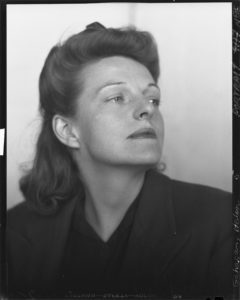
In this Historic year for women in politics, our new podcast series, From The Outside In: Women In Politics, showcases important interviews from the Bancroft Library collection with women who have left their mark on the political arena.
This six episode series will run until the 2016 Presidential Election, with new episodes released every Monday. The series is narrated by Emmy-Award winning journalist Belva Davis.
This week please join us for episode two, “Cracking the Ceiling and Breaking the Mold,” featuring Communist Party activist LaRue McCormick and California’s famed “Pink Lady,” Congresswoman Helen Douglas.
This episode, and further information about the series, can be found at the Oral History Center website.